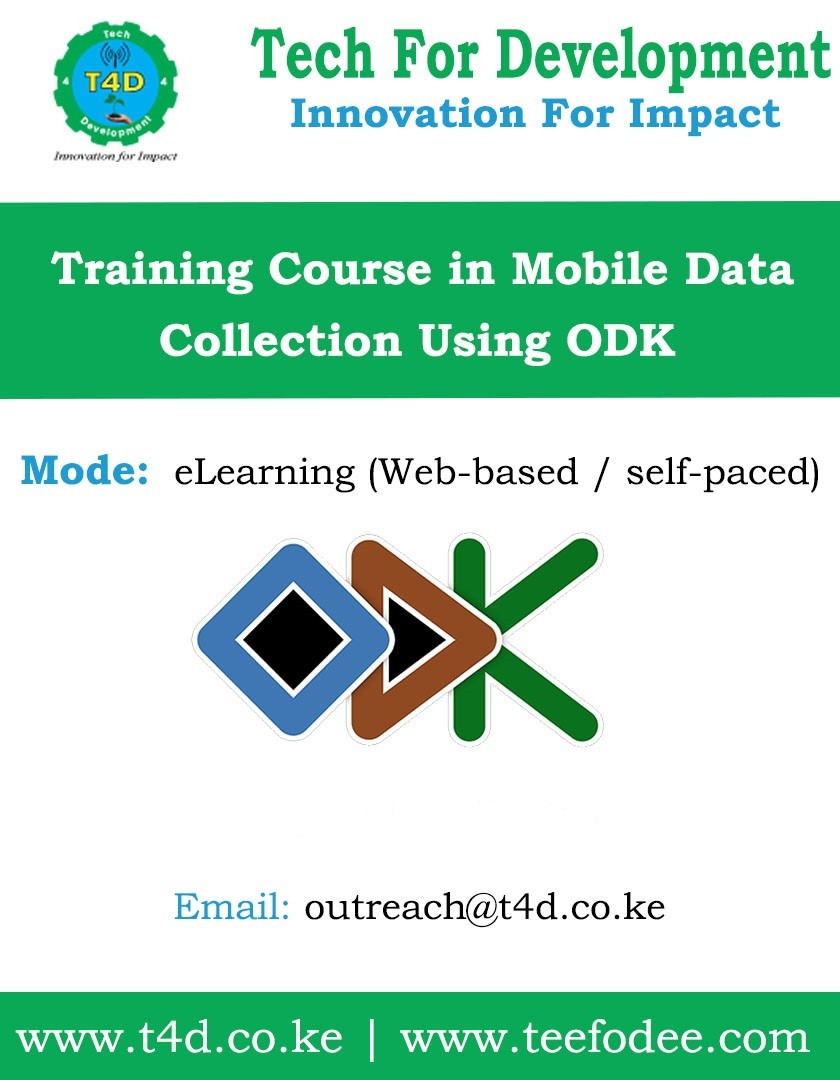Available courses
- Teacher: Momentas Learning

- Teacher: Momentas Learning

Unlock the Power of Data Collection with ODK
This "Mobile Data Collection Using ODK" course is designed to equip you with the skills and knowledge to collect, manage, and analyze data efficiently using Open Data Kit (ODK). Whether you're a researcher, field team member, or professional looking to streamline your data collection process, this course is for you.
What You’ll Learn:
- Form Building Made Easy: Create powerful forms that include photos, GPS locations, skip logic, calculations, external datasets, multiple languages, and more.
- Offline Data Collection: Discover how to collect data anywhere using ODK's mobile and web apps, even without an Internet connection. Sync your forms and submissions seamlessly when you're back online.
- Data Analysis Simplified: Learn to download your data as a CSV or link ODK to tools like Excel, Power BI, Python, or R to create live-updating dashboards for real-time insights.
Why Choose This Course?
ODK is trusted by researchers, field teams, and professionals worldwide to collect critical data in diverse environments. This course is your step-by-step guide to mastering ODK and making data collection smarter and more effective.
Start your journey today and transform the way you collect and analyze data!
- Teacher: Momentas Learning
Introduction
The Jira for Remote Project Management Course is designed to help project managers and team members effectively use Jira to manage projects remotely. This course covers Jira’s powerful features for planning, tracking, and collaborating on tasks, enabling remote teams to maintain productivity and deliver projects on time.
Course Details
1. Duration: 4–6 weeks
2. Format: Online/Hybrid with video tutorials, live demos, and hands-on exercises
3. Prerequisites: Basic understanding of project management concepts is helpful but not required
4. Tools: Jira Software, browser access, and optional integrations with other tools like Slack and Confluence
Course Topics (Lessons)
1. Introduction to Jira: Overview, setup, and interface walkthrough
2. Project Setup: Creating and configuring projects for remote teams
3. Task Management: Creating, assigning, and tracking tasks in Jira
4. Agile Practices in Jira: Using Scrum and Kanban boards effectively
5. Reports and Dashboards: Monitoring progress and team performance
6. Integrations and Automation: Enhancing workflows with Jira integrations
Course Outline
1. Week 1: Introduction to Jira, account setup, and interface navigation
2. Week 2: Creating projects and managing tasks for remote teams
3. Week 3: Using Agile boards, sprints, and workflows effectively
4. Week 4: Reporting, dashboards, and automating routine tasks
Topics to Be Covered
1. Setting up Jira for remote project management
2. Configuring workflows and managing team permissions
3. Using Scrum and Kanban boards for Agile projects
4. Generating reports to track progress and identify bottlenecks
5. Integrating Jira with communication tools like Slack and Confluence
How Has Jira Been Used in the Past?
Jira has transformed how remote teams manage projects by:
1. Software Development: Planning sprints, tracking bugs, and managing releases
2. Marketing: Coordinating campaigns across dispersed teams
3. HR: Managing recruitment workflows and onboarding processes
4. Operations: Streamlining workflows for cross-functional teams
Course Requirements
1. Access to a Jira Software account (free trial or paid subscription)
2. Basic computer skills and reliable internet connection
3. Willingness to adapt to new project management tools
Who Should Take This Course?
1. Remote project managers and team leads
2. Scrum masters and Agile practitioners
3. Professionals transitioning to remote work
4. Anyone looking to enhance project visibility and collaboration
What Can You Do With Jira for Remote Project Management?
1. Plan and execute projects with distributed teams
2. Monitor progress using Agile boards and reports
3. Streamline task assignments and team communication
4. Automate repetitive project management tasks
5. Integrate Jira with tools like Slack, Confluence, and GitHub for seamless workflows
About the Instructor
The instructor is a certified Jira expert with extensive experience in remote project management and Agile methodologies. They have trained teams worldwide on using Jira to achieve project success and specialize in adapting workflows for remote collaboration.
Learning Outcomes
By the end of this course, you will:
1. Master Jira’s interface and features for remote project management
2. Configure projects, workflows, and Agile boards effectively
3. Track and report progress with advanced Jira tools
4. Automate workflows and integrate Jira with other tools
5. Manage projects efficiently in a remote or distributed team environment
- Teacher: Momentas Learning

Learning Objectives: Upon completion of the Corporate Governance Course, participants will be able to:
- Understand and apply foundational principles of corporate governance, including international standards such as OECD, Cadbury, and King IV.
- Differentiate between governance, management, and oversight roles, using structured models such as the RACI Matrix and the Three Lines of Defense.
- Analyze the structure and effectiveness of boards, including composition, independence, diversity, and succession planning.
- Enhance strategic alignment between corporate governance practices and enterprise strategy, performance management, and risk oversight.
- Integrate ethical leadership, integrity, and organizational culture into governance practices, especially during crisis or transformation.
- Apply ESG (Environmental, Social, and Governance) frameworks and stakeholder engagement strategies to build long-term value and corporate accountability.
- Demonstrate strategic leadership and decision-making in boardroom scenarios, using simulations and real-world case studies.
Expected Outcome: Participants in the Corporate Governance Training Course will;
- Develop strategic insight and practical expertise in high-level governance practices.
- Critically evaluate corporate governance frameworks and identify structural/performance gaps.
- Apply global governance principles: (OECD Guidelines, King IV Report, Cadbury Report.
- Define and clarify the distinction between board and management responsibilities.
- Improve board effectiveness through: Enhanced composition and Stronger oversight mechanisms
- Align governance with strategic execution using: COSO ERM (Enterprise Risk Management), Balanced Scorecard.
- Embed ethics and integrity into organizational governance culture.
- Lead effectively during crisis situations with sound governance judgment.
- Manage stakeholder expectations amid rising ESG (Environmental, Social, Governance) pressures.
- Influence decision-making in the boardroom to support strategic outcomes.
- Drive sustainable value creation through robust governance practices.
- Promote a culture of accountability, transparency, and strategic foresight.
- Teacher: Momentas Learning